A reflection on India's plastic diet
One of our exec members, Tessa Laven, spent 9 weeks exploring Northern India and Nepal over summer. During her travels, she jotted down some thoughts on India's attitude towards waste and the environment. She explores ideas around what India can teach us about waste management, being a responsible traveller, and Western consumerism.


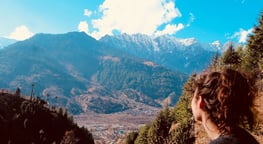
Manali, Himachal Pradesh

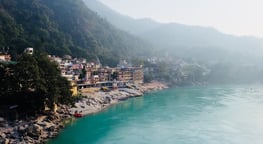
Rishikesh, Uttarakhand

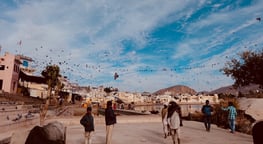
Pushkar, Rajastha


Pushkar, Rajastha


Jaisalmer, Rajasthan

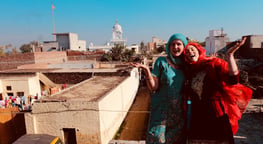
Amritsar, Punjab
Exec member Tessa Laven shares some thoughts written during her 9 weeks exploring Northern India and Nepal over summer...
11/01/18
Hello SFC members, partners, and followers! I was hoping to write a series of blog posts during my time travelling India, however, the craziness of travelling has caught up on my efforts to do so. As time has gone on and I’ve been able to experience and understand the nature of the place a bit better, I’ve realised that my earlier posts may not have done justice to this incredible country.
A little about myself... I was part of the SFC exec team last year and am sticking around this year too. I’m entering my final semester studying anthropology and marketing. This has led to an interest in combining anthropology, sustainability, and development to explore indigenous knowledges about the environment, as well as contemporary social relationships to it.
Since high school, and over the course of my Anthropology studies, I've become increasingly intrigued by India- her food, her landscape, her traditions, history, and people. Having travelled India for the last 7 weeks, I can confirm that it is a country home to an extremely vibrant culture, numerous juxtapositions, immense diversity, inequality, and community, deep-rooted faith and tradition, and a rich, turbulent history that weaves itself into every facet of the environment, the culture, and the customs. I guess it is the desire to experience this difference that inspires myself and others to travel to such a place.
Now, with two weeks left (which we are spending in Nepal), I’m finally getting round to writing this blog post! Thanks to a veeery delayed bus ride I’ve had some good time to think. My focus for these posts was to be on my encounters with, and observations of sustainability and climate change in India. Before arriving here I’d read a bit about the various policies and actions being put forward by the Indian government. This included banning plastic bags, the development of 100 ‘smart cities’, the switch to solar power...
I've come to realise that, for India, the challenge lies in providing a quick solution to the rapid urbanisation, while also thinking about how these solutions can be sustainable in the long term. I’ve also realised that a complex (and very universal) challenge lies ahead: educating and empowering people to look after their natural environments. Back home, Auckland is experiencing this too- although it's hard to compare a population of 1.3 million to Delhi, a city of nearly 19 million! How do you inspire cities of this scale to make ‘sustainable’ choices when they are having to search for the quickest and most affordable solution? These are places of extreme wealth and extreme poverty, and the challenges of everyday life appear to be far more important than addressing the pollution problem. These are also places that need sustainable solutions the most, as highlighted by Delhi’s shocking air pollution. I have a strong belief that addressing pollution and climate change issues will enhance livelihoods and create a more prosperous future for many.
It is no surprise that, in India, the use of single-use plastic is far and wide. Until a viable and affordable eco-friendly alternative is adopted, India and the rest of the world will continue to choke under the mass waste purging sea life, roadsides, townships, drainage systems, riverbanks... The problem needs to be addressed at the very source, rather than just dealing with the aftermath.
India's pollution situation is not all doom and gloom. While a first-timer to Delhi, like myself, may view the current pollution situation as an almost apocalyptic scenario, I’ve been informed by other travellers that the current prime minister has managed to clean up the place a lot. It may come as a surprise that the recycling rates are actually very vibrant. I’m yet to see this put into practice but it has got me thinking... Me, my friends, my family, my community have become blind to a very serious problem. We are lucky. All the rubbish we produce gets neatly put into a rubbish bin and that’s the last we see of it. Once re-homed in the dump, it’s not our problem. A lot of the trash that people produce here (in the smaller centres especially) doesn’t go away. It occupies old playgrounds, community gardens, street corners, hillsides and ditches. Stray dogs and holy cows feast upon a plastic banquet.

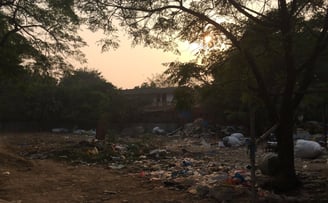
Pollution in the suburbs of New Delhi
The pollution is perhaps what has surprised me most about India. One of our first stops in India was a holy town called Rishikesh (six hour bus ride North of Delhi) on the banks of the River Ganga. Even in this holy place, where the river and surrounding mountains are worshipped as gods and thought to hold divine powers, the litter situation was no different to the city. I found it so baffling that people would litter the same environment they worshipped as a divine being, the same environment that gave the township a unique energy, and the same environment that attracts hoards of religious pilgrims, yoga enthusiasts, Indian families, and foreign backpackers every year.
Over a dinner one night, I raised these concerns with a young, local, Hindu guy. He explained that people follow so many moral rules here. Religion rules life. Parents enforce rules. Governmental rules are no match to the 'rules' enforced by ones faith. Cultural custom, religious belief, family and community have been pillars of Indian society for centuries, and continue to dictate attitudes and relationships towards the environment.
Aside from these societal and cultural conceptions, I believe there is more to the pollution problem. In my opinion, these factors sustain the problem:
The infrastructure is not there to inspire an attitude change.
People have not had to deal with so many single-use plastics in the past.
There is a throwaway culture particularly among the middle and upper class who have more expendable income.
For locals there seems to be far more pressing issues to tackle first. There are a billion other Indians in this country and rupees are scarce. Like the majority of people, many Indians tend to be individualistic in their attitudes and actions, ignoring the effect of their actions on the natural environment. This is a universal issue.
Plastic has become necessary for health and sanitary reasons, as water and food systems strain under the burgeoning demands of urban populations, and as climate change creates an increasingly volatile environment for rural food producers and their communities.
Western capitalism, globalisation, and the preying eyes of polluting corporations has accelerated the use of plastic, and the amount of waste. Locals are left dealing with the aftermath with limited governmental support.
Obviously there is no simple answer and a solution does not change things over night. We, as New Zealanders, are guilty too. We still have a long way to go in terms of caring for our environment in the way we should.
I must point out some really good things we have seen:
Natural substances such as clay and leaves are turned into plates and cups and are used as a single-use alternative to plastic.
Wind turbines in the desert (!!) powering local communities.
Barefoot college - teaching women how to be solar power engineers and promoting solar power products such as the solar cooker and solar water heater.
A big repair culture - shoe repair, seamstresses, vehicle repair.
Bikes, mopeds, public transport (introduction of electric buses and tuk tuks) are all popular forms of transport. They are more of a necessity than a personal choice. How good would electric tuk tuks in Auckland be though!
Vegetarianism and Veganism- obviously for religious reasons but the lack of animal agriculture means less carbon emissions as well as an abundance of fresh vegetables and delicious, healthy food.
Grassroot initiatives making a difference in local communities


Samosa and chai break in Varanasi.
Note: packaging made from natural materials

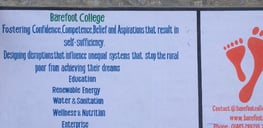
Barefoot College

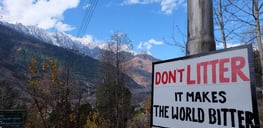
One in a series of signs found in Manali
Definitely a few things in there we could do more at home!
A few things I have learnt:
The effect of policy may not be as widespread or even apparent at all.
Sustainability is more than just good waste management or banning plastic bags; it’s about culture, psyche, education, and empowerment
A solution that works well in one place won't necessarily work well somewhere else. Proposed solutions must incorporate locally-specific needs, attitudes, and demands.
This planet is beautifully diverse. We are fortunate enough to be able to visit some amazing places. Be a responsible tourist, avoid contributing to the waste as much as possible, and respect the environment where ever you go.
Seek to understand custom and how that shapes people’s actions and attitudes. It can be easy to judge things we don’t understand. Support the positive actions that you encounter.
Enjoy the pictures I have included. Looking forward to spending some time in Nepal and seeing what this beautiful country has to offer.
India, I’ll be back!
